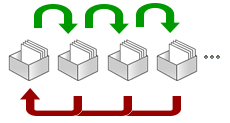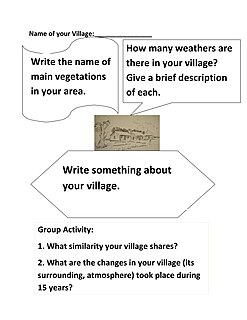
Learning theory describes how students receive, process, and retain knowledge during learning. Cognitive, emotional, and environmental influences, as well as prior experience, all play a part in how understanding, or a world view, is acquired or changed and knowledge and skills retained.

Spaced repetition is an evidence-based learning technique that is usually performed with flashcards. Newly introduced and more difficult flashcards are shown more frequently, while older and less difficult flashcards are shown less frequently in order to exploit the psychological spacing effect. The use of spaced repetition has been proven to increase the rate of learning.
A teaching method comprises the principles and methods used by teachers to enable student learning. These strategies are determined partly on subject matter to be taught and partly by the nature of the learner. For a particular teaching method to be appropriate and efficient it has to be in relation with the characteristic of the learner and the type of learning it is supposed to bring about. Suggestions are there to design and selection of teaching methods must take into account not only the nature of the subject matter but also how students learn. In today's school the trend is that it encourages much creativity. It is a known fact that human advancement comes through reasoning. This reasoning and original thought enhances creativity.

In psychology, cognitivism is a theoretical framework for understanding the mind that gained credence in the 1950s. The movement was a response to behaviorism, which cognitivists said neglected to explain cognition. Cognitive psychology derived its name from the Latin cognoscere, referring to knowing and information, thus cognitive psychology is an information-processing psychology derived in part from earlier traditions of the investigation of thought and problem solving.

Active learning is "a method of learning in which students are actively or experientially involved in the learning process and where there are different levels of active learning, depending on student involvement." Bonwell & Eison (1991) states that "students participate [in active learning] when they are doing something besides passively listening." In a report from the Association for the Study of Higher Education (ASHE), authors discuss a variety of methodologies for promoting active learning. They cite literature that indicates students must do more than just listen in order to learn. They must read, write, discuss, and be engaged in solving problems. This process relates to the three learning domains referred to as knowledge, skills and attitudes (KSA). This taxonomy of learning behaviors can be thought of as "the goals of the learning process." In particular, students must engage in such higher-order thinking tasks as analysis, synthesis, and evaluation.

A flashcard or flash card is a card bearing information on both sides, which is intended to be used as an aid in memorization. Each flashcard bears a question on one side and an answer on the other. Flashcards are often used to memorize vocabulary, historical dates, formulas or any subject matter that can be learned via a question-and-answer format. Flashcards can be virtual, or physical.

Constructivism is a theory in education which posits that individuals or learners do not acquire knowledge and understanding by passively perceiving it within a direct process of knowledge transmission, rather they construct new understandings and knowledge through experience and social discourse, integrating new information with what they already know. For children, this includes knowledge gained prior to entering school. It is associated with various philosophical positions, particularly in epistemology as well as ontology, politics, and ethics. The origin of the theory is also linked to Swiss developmental psychologist Jean Piaget's theory of cognitive development.
Metacognition is an awareness of one's thought processes and an understanding of the patterns behind them. The term comes from the root word meta, meaning "beyond", or "on top of". Metacognition can take many forms, such as reflecting on one's ways of thinking and knowing when and how to use particular strategies for problem-solving. There are generally two components of metacognition: (1) knowledge about cognition and (2) regulation of cognition.

Reading comprehension is the ability to process text, understand its meaning, and to integrate with what the reader already knows. Fundamental skills required in efficient reading comprehension are knowing meaning of words, ability to understand meaning of a word from discourse context, ability to follow organization of passage and to identify antecedents and references in it, ability to draw inferences from a passage about its contents, ability to identify the main thought of a passage, ability to answer questions answered in a passage, ability to recognize the literary devices or propositional structures used in a passage and determine its tone, to understand the situational mood conveyed for assertions, questioning, commanding, refraining etc. and finally ability to determine writer's purpose, intent and point of view, and draw inferences about the writer (discourse-semantics).

Study skills, academic skill, or study strategies are approaches applied to learning. Study skills are an array of skills which tackle the process of organizing and taking in new information, retaining information, or dealing with assessments. They are discrete techniques that can be learned, usually in a short time, and applied to all or most fields of study. More broadly, any skill which boosts a person's ability to study, retain and recall information which assists in and passing exams can be termed a study skill, and this could include time management and motivational techniques.
Sheltered instruction is an approach to teaching English language learners which integrates language and content instruction. The phrase "sheltered instruction," original concept, and underlying theory of comprehensible input are all credited to Stephen Krashen.
Constructivist teaching is based on constructivist learning theory. Constructivist teaching is based on the belief that learning occurs as learners are actively involved in a process of meaning and knowledge construction as opposed to passively receiving information.

Discovery learning is a technique of inquiry-based learning and is considered a constructivist based approach to education. It is also referred to as problem-based learning, experiential learning and 21st century learning. It is supported by the work of learning theorists and psychologists Jean Piaget, Jerome Bruner, and Seymour Papert.

Socratic questioning was named after Socrates. He used an educational method that focused on discovering answers by asking questions from his students. According to Plato, who was one of his students, Socrates believed that "the disciplined practice of thoughtful questioning enables the scholar/student to examine ideas and be able to determine the validity of those ideas". Plato described this rigorous method of teaching to explain that the teacher assumes an ignorant mindset in order to compel the student to assume the highest level of knowledge. Thus, a student has the ability to acknowledge contradictions, recreate inaccurate or unfinished ideas and critically determine necessary thought.

Reciprocal teaching is an instructional activity that takes the form of a dialogue between teachers and students regarding segments of text for the purpose of constructing the meaning of text. Reciprocal teaching is a reading technique which is thought to promote students' reading comprehension. A reciprocal approach provides students with four specific reading strategies that are actively and consciously used to support comprehension: Questioning, Clarifying, Summarizing, and Predicting. Palincsar (1986) believes the purpose of reciprocal teaching is to facilitate a group effort between teacher and students as well as among students in the task of bringing meaning to the text.
Reciprocal teaching is best represented as a dialogue between teachers and students in which participants take turns assuming the role of teacher. -Annemarie Sullivan Palincsar

Thematic teaching is the selecting and highlighting of a theme through an instructional unit or module, course, or multiple courses. It is often interdisciplinary, highlighting the relationship of knowledge across academic disciplines and everyday life. Themes can be topics or take the form of overarching questions. Thematic learning is closely related to interdisciplinary or integrated instruction, topic-, project- or phenomenon-based learning. Thematic teaching is commonly associated with elementary classrooms and middle schools using a team-based approach, but this pedagogy is equally relevant in secondary schools and with adult learners. A common application is that of second or foreign language teaching, where the approach is more commonly known as theme-based instruction. Thematic instruction assumes students learn best when they can associate new information holistically with across the entire curriculum and with their own lives, experiences, and communities.
Educational data mining (EDM) describes a research field concerned with the application of data mining, machine learning and statistics to information generated from educational settings. At a high level, the field seeks to develop and improve methods for exploring this data, which often has multiple levels of meaningful hierarchy, in order to discover new insights about how people learn in the context of such settings. In doing so, EDM has contributed to theories of learning investigated by researchers in educational psychology and the learning sciences. The field is closely tied to that of learning analytics, and the two have been compared and contrasted.
The natural approach is a method of language teaching developed by Stephen Krashen and Tracy Terrell in the late 1970s and early 1980s. It aims to foster naturalistic language acquisition in a classroom setting, and to this end it emphasises communication, and places decreased importance on conscious grammar study and explicit correction of student errors. Efforts are also made to make the learning environment as stress-free as possible. In the natural approach, language output is not forced, but allowed to emerge spontaneously after students have attended to large amounts of comprehensible language input.
The concept or theory of meaningful learning is that learned information is completely understood and can now be used to make connections with other previously known knowledge, aiding in further understanding. Since information is stored in a network of connections, it can be accessed from multiple starting points depending on the context of recall. Meaningful learning is often contrasted with rote learning, a method in which information is memorized sometimes without elements of understanding or relation to other objects or situations. A real-world example of a concept the learner has learned is an instance of meaningful learning. Utilization of meaningful learning may trigger further learning, as the relation of a concept to a real-world situation may be encouraging to the learner. It may encourage the learner to understand the information presented and will assist with active learning techniques to aid their understanding. Although it takes longer than rote memorization, information is typically retained for a longer period of time.
The Cognitive Theory of Inquiry Teaching, also referred to as the Cognitive Theory of Interactive Teaching, was developed by Allan Collins and Albert L. Stevens. Allan Collins was a chief scientist at Bolt Beranek and Newman Inc., a research firm in Cambridge Massachusetts. He is also a specialist in the field of cognitive science and human semantic processing. Albert L. Stevens was a senior scientist at Bolt Beranek and Newman Inc. He was also director of the company's Artificial Intelligence, Education Technology and Training Systems Division. He is also a specialist in cognitive science. The Cognitive Theory of Inquiry Teaching according to Collins and Stevens (1981) requires the learner to construct theories and principles through dialogue, the teaching of self-questioning techniques and the teaching of metacognitive or self-monitoring skills, all with the intent of clarifying misconceptions so the theory or principle is well articulated and developed. The essence of the cognitive theory of Inquiry teaching is that of developing students' metacognitive skills. Inquiry teaching deliberately attempts to develop these stills through instruction.










